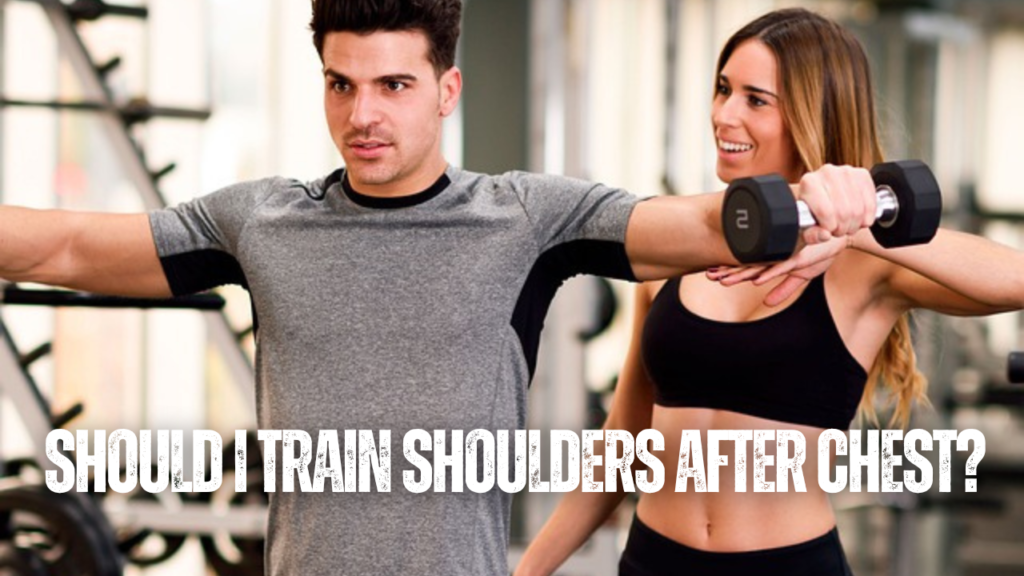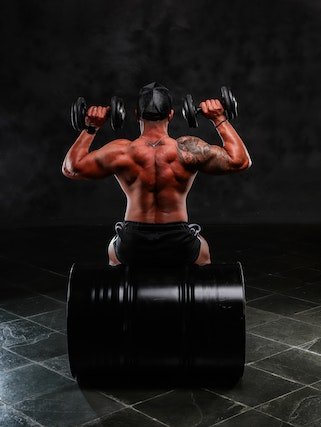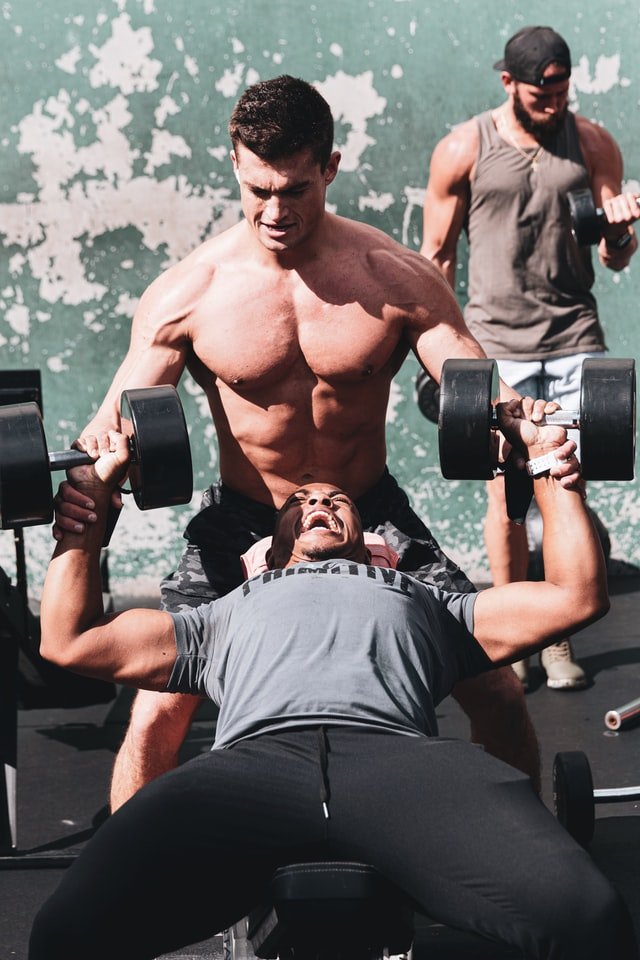
Should I Train Shoulders After Chest? 10 Things To Consider
Working out should always be an enjoyable experience that you look forward to. But when it comes to lifting weights, performing the right exercises at the correct time can sometimes be a bit confusing – especially when it comes to training certain muscle groups.
It leaves you to ask “is it ok to train shoulders after chest”, so if you’re wondering whether or not you should read on for answers!
In this blog post, we’ll discuss a few things you should know about training your shoulders after chest and whether it’s worth doing or if you should look to select a different muscle group to optimise your gains.
Should I Train Shoulders After Chest?
The one thing to understand is that you do use your deltoid muscles whenever you are pushing/pressing any kind of weight. With this in mind, there are two trains of thought. One is that you should always leave a 48-hour window of rest between any chest and shoulder work to ensure that smaller muscles don’t get overworked. The other is that if you’re looking to make the most out of your workout, then it’s ok to train both muscle groups in the same session. However, doing so can risk injury and increase the chances of deltoid fatigue, especially if you’re pushing yourself to the limit. If you are looking to work your shoulders after your chest, then it’s best to focus on a light isolation workout with high reps instead. This will help prevent any overtraining of the deltoids that could potentially reduce their development. However, that said the general consensus would be to split your workouts differently so that your shoulders are worked on a separate day, as this will help reduce the chance of injury and improve your chances of better gains.
Let’s now look more in-depth at whether you should train your shoulders after chest or not…
Shoulders used with chest exercises
As we just mentioned, your shoulder muscles are always engaged when you are pushing/pressing any kind of weight. This means that even though you may not specifically be targeting them, they will still be worked during any chest exercise.
The deltoid muscles are comprised of three heads (anterior, medial and posterior), each of which is responsible for different actions in the shoulder. When you are performing any chest exercise, the anterior deltoids are usually engaged as they help stabilize your position during push-ups or bench presses.
So, the advantage of working your shoulders immediately after a chest workout is that your deltoids are already warmed up and this can help ensure that you get the most out of your shoulder exercises.
The disadvantage, however, is that smaller muscle groups like your deltoids are more prone to fatigue and overtraining than larger muscles like those in the chest or legs. As a result, it’s best to give them more rest between training sessions so that they don’t suffer any performance losses.
Smaller muscle group
As we just discussed, your deltoid muscles are smaller and more prone to fatigue and overtraining than larger muscle groups. This means that when you are training shoulders after chest, you need to be extra careful to ensure that you don’t push them too hard or too far.
As you know the pec muscles are much bigger and stronger than your deltoids – so if you are pushing yourself to the limit during a chest workout, then it’s likely that your shoulders will be fatigued as well. This can lead to reduced performance and can even increase your chances of injury due to overtraining.
If you do decide to train both muscle groups in the same session, then make sure to select lighter weights and higher reps for your shoulder exercises. This will help reduce the risk of injury and prevent any excessive fatigue from setting in too quickly.
You could say the same thing about your triceps as well; they are smaller than your chest muscles and also require a rest period of 48 hours between workouts, but some do like to train them after their chest for the same reason.

May reduce performance
For some, working out their shoulders after a chest workout won’t be an issue. As we just mentioned, smaller muscle groups like the deltoids are more prone to fatigue and overtraining than larger muscles – so if you don’t push yourself too hard during chest exercises then there’s a good chance that your shoulders won’t suffer any performance losses.
However, for those who want to get the most out of their workouts and maximize their gains, it’s best to give your shoulders more rest between sessions. This will ensure that they are fully recovered and able to perform optimally during the next workout.
If working your shoulders after your chest works for you, then by all means stick to doing so, but be aware that for many it may be reducing their gains as a result.
Rest period
It’s important to remember that while you can train both muscle groups in the same session or even the day after, it’s still best to give them a break of at least two days between training sessions. This will help ensure that your muscles are fully recovered before the next workout and also reduce the risk of overtraining.
It also depends on where your priorities lie with regard to your chest and shoulders, for example if you are looking to improve your shoulder mass and development then it’s best to give them more rest and only do a light, high-rep isolation workout.
So, if you want to work out your shoulders after your chest, then make sure to give them at least 48-72 hours rest between sessions. This will help ensure that they are ready for the next session and performing at their peak.
Related: Why do I feel shoulder press in my lats?
Train both muscle groups in the same workout?
It is possible to train both muscle groups in the same session, but as mentioned it’s best to give your smaller muscles more rest. This will help ensure that they are not overtrained or fatigued and can perform optimally during the next sessions.
If you do decide to work out both your chest and shoulders together, then make sure to select lighter weights and higher reps for your shoulder exercises. This will reduce the risk of injury and fatigue and help ensure that your shoulders are properly trained without compromising the performance of either muscle group.
I always tend to train my shoulders separately because I find I can’t give my shoulders the energy and attention they deserve if I train them after a heavy chest workout.
Train a different muscle group
If you want to ensure that you are able to maximise your gains without pushing yourself too hard or risking injury, then it’s best to train a different muscle group instead of your shoulders. This will ensure that your shoulders are given enough time to recover between workouts and also provide an opportunity for you to focus on another body part.
Training your legs the day after a chest workout is generally a good idea as it’s unlikely to affect your chest performance and will provide a welcome break from the usual upper body exercises.
Another muscle group to train after your chest would be your back, as the nature of these exercises means you are pulling as opposed to pushing which makes them easier on the shoulders and makes sense anatomically speaking. A lot of fitness programs these days incorporate “push & pull” days.
Then you can be safe in the knowledge that your shoulders are ready to go the following day and you won’t be compromising their performance.

Risk injury
Remember the shoulder joint is very delicate, so it’s important that you give them enough time to rest and recover between workouts.
The range of motion the shoulder joint has access to means that it is particularly prone to injury if not given the proper rest and recovery, so it’s important to ensure you are giving your shoulders enough time off between workouts.
Training them after a chest session could mean that they are fatigued when beginning the shoulder exercises, increasing the risk of injury due to poor form or technique.
No matter how careful you are, there is always a risk of injury when training. This is particularly true if you are working out both your chest and shoulders in the same session. The fatigue from the chest exercises can lead to an increased risk of injury or strain on your muscles due to the fact that your shoulders will already be under more pressure than normal.
Therefore, it’s important to consider whether or not it is worth the risk when it comes to training both muscle groups in one session.
You may reduce shoulder development
If you are looking to build mass and strength in your shoulders then working them after a chest session could mean that you are not giving them the attention and energy they need to develop optimally.
The lighter isolation exercises used when training your shoulders after a chest session may not be ideal for building mass or strength in this muscle group, so it’s important to consider whether or not you are compromising your shoulder development by doing this.
Some might argue that “pre-exhausting” the deltoids with a chest session is the way to go, that might work for some, however, it is not something I would recommend as a long-term solution for maximising shoulder development.
Related: Why is my lateral raise so weak?
Exception to rule
There are always exceptions to the rule about exercise, and if you are someone who finds training your shoulders after a chest workout beneficial, then it may be possible to do so in the same session or the following day.
Many powerlifters and bodybuilders have great success with training their chest and shoulders together in the same session, however, these are individuals who have a high level of experience in strength and conditioning.
If you feel like you might be able to manage both muscle groups in the same session then I would recommend doing a light isolation workout with high reps to ensure that your shoulders are not overworked.
However, all things considered, you should be aware of the potential risks before doing so and make sure that your training plan does not include this type of workout too often.
Final thoughts…
It is important to consider the risks associated with training your shoulders after a chest workout, and how this might affect your shoulder performance and development in the long run.
If you decide to train them together then I would recommend doing a light isolation exercise with high reps to ensure that your shoulders are not overworked.
Remember, it is always better to err on the side of caution when it comes to weight training and consider how this might affect your body’s ability to recover and develop optimally. Is it okay to train shoulders after chest?
The answer ultimately lies with you, the athlete. Make an informed decision based on your own level of experience and fitness goals. Listen to your body and keep in mind the risks associated with working out both muscle groups together. This way you’ll ensure that you reap all of the potential benefits from your training sessions.
Have you trained your shoulders after a chest workout? Let me know in the comments section below.


